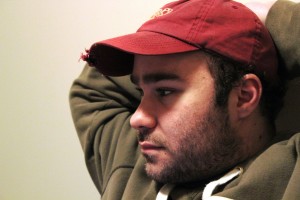
Sean Ekins is a dungeon master – a storyteller within the tabletop role-playing game Dungeons and Dragons (D&D). While regular players create characters to play as within the game, he single-handedly creates mythical worlds and fantastical campaigns. Without dungeon masters, there would be no D&D as we know it – they are the story.
How long have you been playing D&D?
I started probably six or seven years ago. I haven’t played continuously from then, though. I’ve played probably three separate times where it was like a year or so I would play and then stop for a while.
You regularly play as the dungeon master – what is that?
A dungeon master is basically everyone except for the player characters. So, all non-player characters in the world you would play. You have to know what’s going on in the world because you’re the one who’s rolling everything in the world for stats. When you have an enemy, you have to know their armour class, which is basically how difficult they are to hit. You have to know all their saves, so like if someone tries to poison them or something you would roll a save to see if they get poisoned. You have to know how they’re supposed to act.
How do you keep track of all the things you’re expected to know as a dungeon master?
There’s three books: the players handbook has like all the equipment and stuff in it, there’s a monster just full of monsters and there’s a dungeon master’s guide which is full of helpful tips and stuff.
How do you make sure players don’t just get wiped out by monsters?
There’s certain kinds of rules, like limitations you’re supposed to follow just to keep it fun. Like, you’re not really supposed to put the party against something that they absolutely can’t kill. If it’s someone that they’re really not supposed to fight and it would be completely their fault it’s one thing, but if they have a reasonable chance of actually getting into combat, it should be something that they have a chance of killing.
So the game is pretty combat-focused for players then?
Sometimes we have campaigns where there’s really no story, it’s just all combat. I try and make it so they have an option, because some people like to play bards and stuff, and bards aren’t really that great in combat, they’re more skill-focused. I try and make it so a wide variety of characters can do things. So if you get into an encounter there will be an option for combat, but you can talk your way through it if you prefer.
Do you remember any campaigns in particular?
I remember one campaign, we had a brand new DM at the time, which was forever known as the goblin meat grinder. There’s this thing called an attack of opportunity and you’re supposed to get one per turn. There’s a feat that can give you a couple more, but you’re not supposed to have that many. In that situation we were all standing beside a cave. There were goblins running out and no one knew that rule so we were just taking as many attacks of opportunity as there was goblins running out, and killing them as they came out. We killed like 50 goblins over the course of a couple turns. It was pretty funny; the DM was so angry because he didn’t understand what was going on and why what he was doing wasn’t working. That was a pretty memorable one for me.
Why do you think people play D&D, whether they’re a dungeon master or a regular player?
As dungeon master, it’s kind of a creative outlet. As a player, it’s kind of like playing a video game that’s cooperative and turn-based.